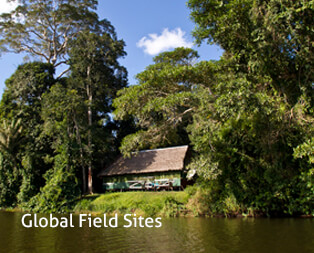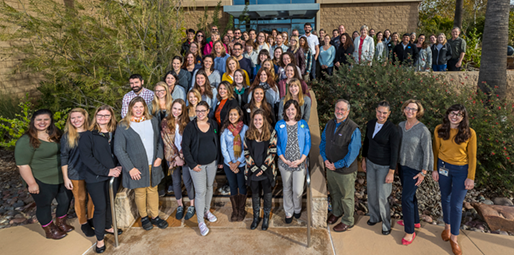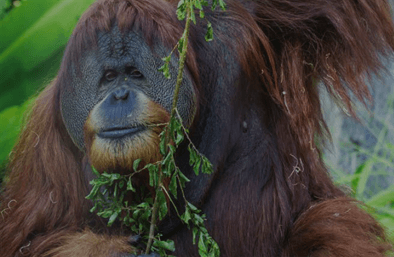Cameroon Approves Logging That Could Destroy Critical Ebo Forest Gorilla Habitat
New Logging Concession Threatens Many Endangered Primates and Forthcoming Red Colobus Action Plan
The government of Cameroon has approved a logging concession in the Ebo Forest, in the nation’s Littoral Region, despite the the forest’s designation as a critical habitat for many species of endangered primates—including gorillas, chimpanzees and red colobus monkeys. A decree confirming the logging concession was issued July 22, 2020. The decree is in direct opposition to an international agreement to protect gorillas and their habitats that the Cameroon government signed July 20.
“This is a practical example of how to accelerate the extinction of critically endangered species, like gorillas,” said Bethan Morgan, Ph.D., San Diego Zoo Global’s Central Africa Program head, who has been working to conserve the great apes of the Ebo Forest since she first observed gorillas there in 2002. “This forest and its resources are the lifeblood of local people, who have worked so hard to conserve the unique population of gorillas and their habitat over the past decades,” she said. “This government decision takes the land away from community custodianship and into the hands of those with short-term interests in mind. We can only hope that those with a long-term interest in the survival of Ebo’s communities, forest and wildlife succeed in influencing any forthcoming management plan.”
In February, Cameroon’s minister of forestry signed two orders proposing the classification of two forestry management units for timber extraction in the Ebo Forest, without giving the local communities living around the Ebo Forest sufficient time and opportunities to provide their input. The Ebo Forest is the ancestral home of more than 40 communities living around it. They depend on it for food and traditional medicines.
In April, more than 60 conservationists, including experts from Global Wildlife Conservation and the International Union for Conservation of Nature (IUCN) Species Survival Commission Primate Specialist Group signed a letter to Cameroon Prime Minister Joseph Ngute, asking that the plans for the logging concessions be put on hold and that the government work with local communities to develop a sustainable land use plan. They argued that adopting a more inclusive process would signal to Cameroon’s international partners, during this critical year for biodiversity, that the government intends to honor its commitments to reduce greenhouse gas emissions. The government did not respond to the letter.
“The Ebo Forest is a globally important ecosystem that is home to some very endangered species, such as Preuss's red colobus,” said Russ Mittermeier, chair of the IUCN Species Survival Commission Primate Specialist Group, who is chief conservation officer for Global Wildlife Conservation and a signatory of the letter to Cameroon’s government. “I cannot comprehend why the government would issue a logging concession for short-term gain to destroy such an important part of Cameroon’s natural heritage. The future value for ecotourism alone would far outweigh the value of the timber, never mind all the other ecosystem service values that the forest provides for local communities.”
The Ebo Forest makes up half of the Yabassi Key Biodiversity Area, making it a site of global importance to the planet’s overall health. It sequesters 35 million tons of carbon, and its destruction would exacerbate the climate and extinction crises. The 579-square-mile (1,500-square-kilometer) forest, which was once slated to become a national park, is home to forest elephants, 12 endemic species of plants, a potentially new subspecies of gorillas and 700 endangered Nigeria-Cameroon chimpanzees.
The Ebo Forest was once home to an important population of the now critically endangered Preuss’s red colobus monkey, a species found only in western Cameroon and southeastern Nigeria. The 17 species of red colobus monkeys are among the most threatened primate groups in mainland Africa—but a soon-to-be-published red colobus conservation action plan offers recommendations to help prevent red colobus extinctions.
Researchers have not been able to confirm the presence of Preuss’s red colobus in the Ebo Forest since 2012. Hunting for the bushmeat trade is believed to have greatly reduced their numbers. Red colobus are usually the first primate species to disappear from forests with heavy hunting pressure. If they disappear from an area, it is likely that many other species are suffering and in decline, as well. If Preuss’s red colobus are still present in the Ebo Forest, conservationists fear the logging concession will increase hunting pressure and could permanently prevent the species from rebounding.
Instead of logging Ebo Forest, conservationists wrote in their April letter that sustainable land use alternatives could be a viable option for generating revenue for Cameroon, supporting the socioeconomic livelihoods of Ebo’s nearby communities and protecting this critical habitat for some of Africa’s most endangered wildlife.
About Global Wildlife Conservation: Global Wildlife Conservation (GWC) conserves the diversity of life on Earth by safeguarding wildlands, protecting wildlife and supporting guardians. The organization maximizes its impact through scientific research, biodiversity exploration, habitat conservation, protected area management, wildlife crime prevention, endangered species recovery and conservation leadership cultivation. Learn more at globalwildlife.org.














